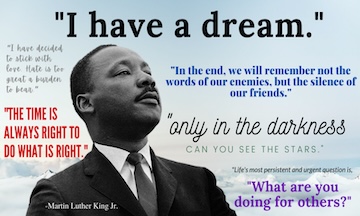
Dr. King was passionate about his vision. He was committed to success, no matter what. He was direct, honest, and nonviolent. He was a visionary leader, committed to changing the world against seemingly insurmountable odds. He was ultimately very successful and was awarded a Nobel Peace Prize.

Leadership is a general topic that people understand in different ways; in fact people have contrasting and conflicting perceptions of how leaders should behave.

We hear lots of noise in conversations and in the media about striving for equality. That’s not it. There’s a better way.

When a leader defines the vision and then sets specific goals to achieve that vision, it’s important to leave a place for team members to create their strategies.

Goals are worthless without an plan of action. Actions are consistent activities moving toward your goal. Fitness happens one day at a time over time.

It might be time to reframe those obstacles and attempt to define a way forward. Those obstacles can become opportunities if you can rethink strategy.

One of the biggest traps I experience with clients is that leadership is a term not universally understood and that leaders don’t know how to lead.

Our reaction is to solve problems and to move ahead, rather than creating a process to respond. Responding is a thinking state, while reacting is an emotional state

Leadership is a system in which the leader builds and equips leaders in teams. Sometimes the leader needs to intervene. Sometimes the leader should observe.

As a musician, I have learned to listen, however there is listening, and there is listening with intention. We often listen without really listening for intent.

